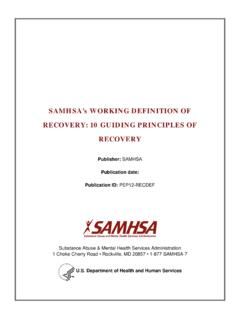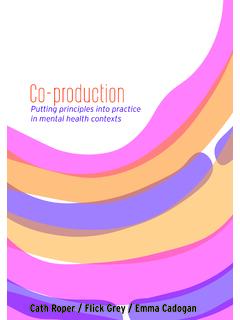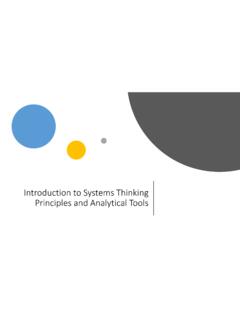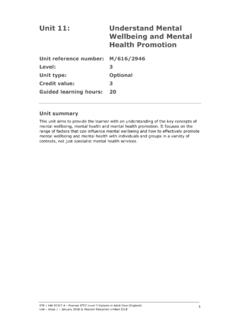Transcription of Principles of Instruction - ed
1 12 AmERIcAN EdUcATOR | SPRING 2012 Principles of InstructionResearch-Based Strategies That All Teachers Should KnowBy Barak RosenshineThis article presents 10 research-based Principles of Instruction , along with suggestions for classroom prac-tice. These Principles come from three sources: (a) research in cognitive science, (b) research on master teachers, and (c) research on cognitive supports. Each is briefly explained : Research in cognitive science: This research focuses on how our brains acquire and use information. This cognitive research also provides suggestions on how we might overcome the limita-tions of our working memory ( , the mental space in which thinking occurs) when learning new material. B: Research on the classroom practices of master teachers: Mas-ter teachers are those teachers whose classrooms made the high-est gains on achievement tests.
2 In a series of studies, a wide range of teachers were observed as they taught, and the investigators coded how they presented new material, how and whether they checked for student understanding, the types of support they provided to their students, and a number of other instructional activities. By also gathering student achievement data, research-ers were able to identify the ways in which the more and less effec-tive teachers : Research on cognitive supports to help students learn complex tasks: Effective instructional procedures such as thinking aloud, providing students with scaffolds, and providing students with models come from this though these are three very different bodies of research, there is no conflict at all between the instructional suggestions that come from each of these three sources.
3 In other words, these three sources supplement and complement each other. The fact that the instructional ideas from three different sources supple-ment and complement each other gives us faith in the validity of these involves helping a novice develop strong, readily accessible background knowledge. It s important that background knowledge be readily accessible, and this occurs when knowledge is well rehearsed and tied to other knowledge. The most effective teachers ensured that their students efficiently acquired, rehearsed, and connected background knowledge by providing a good deal of instructional support. They provided this support by teaching new material in manageable amounts, modeling, guiding student practice, helping students when they made errors, and providing for sufficient practice and review.
4 Many of these teachers also went on to experiential, hands-on activities, but they always did the experiential activities after, not before, the basic material was following is a list of some of the instructional Principles that have come from these three sources. These ideas will be described and discussed in this article: Begin a lesson with a short review of previous Present new material in small steps with student practice after each Ask a large number of questions and check the responses of all Provide Guide student Check for student Obtain a high success Provide scaffolds for difficult Require and monitor independent Engage students in weekly and monthly Rosenshine is an emeritus professor of educational psychology in the College of Education at the University of Illinois at Urbana-Champaign.
5 A distinguished researcher, he has spent much of the past four decades identifying the hallmarks of effective teaching. He began his career as a high school history teacher in the Chicago public schools. This article is adapted with permission from Principles of Instruction by Barak Rosen-shine. Published by the International Academy of Education in 2010, the original report is available at BY JAmES YANGAmERIcAN EdUcATOR | SPRING 2012 131. Begin a lesson with a short review of previous learning: Daily review can strengthen previous learning and can lead to fluent findingsDaily review is an important component of Instruction . Review can help us strengthen the connections among the material we have learned. The review of previous learning can help us recall words, concepts, and procedures effortlessly and automatically when we need this material to solve problems or to understand new material.
6 The development of expertise requires thousands of hours of practice, and daily review is one component of this example, daily review was part of a successful experiment in elementary school mathematics. Teachers in the experiment were taught to spend eight minutes every day on review. Teachers used this time to check the homework, go over problems where there were errors, and practice the concepts and skills that needed to become automatic. As a result, students in these classrooms had higher achievement scores than did students in other practice of vocabulary can lead to seeing each practiced word as a unit ( , seeing the whole word automatically rather than as individual letters that have to be sounded out and blended). When students see words as units, they have more space available in their working memory, and this space can now be used for comprehension.
7 Mathematical problem solving is also improved when the basic skills (addition, multiplication, etc.) are overlearned and become automatic, thus freeing working-mem-ory the classroomThe most effective teachers in the studies of classroom Instruction understood the importance of practice, and they began their les-sons with a five- to eight-minute review of previously covered material. Some teachers reviewed vocabulary, formulae, events, or previously learned concepts. These teachers provided addi-tional practice on facts and skills that were needed for recall to become teacher activities also included reviewing the con-cepts and skills that were necessary to do the homework, having students correct each others papers, and asking about points on which the students had difficulty or made errors.
8 These reviews ensured that the students had a firm grasp of the skills and con-cepts that would be needed for the day s teachers also reviewed the knowledge and concepts that were relevant for that day s lesson. It is important for a teacher to help students recall the concepts and vocabulary that will be relevant for the day s lesson because our working memory is very limited. If we do not review previous learning, then we will have to make a special effort to recall old material while learning new material, and this makes it difficult for us to learn the new review is particularly important for teaching material that will be used in subsequent learning. Examples include reading sight words ( , any word that is known by a reader automati-cally), grammar, math facts, math computation, math factoring, and chemical planning for review, teachers might want to consider which words, math facts, procedures, and concepts need to become automatic, and which words, vocabulary, or ideas need to be reviewed before the lesson addition, teachers might consider doing the following dur-ing their daily review: Correct homework.
9 Review the concepts and skills that were practiced as part of the homework. Ask students about points where they had difficulties or made errors. Review material where errors were made. Review material that needs overlearning ( , newly acquired skills should be practiced well beyond the point of initial mas-tery, leading to automaticity).2. Present new material in small steps with student practice after each step: Only present small amounts of new material at any time, and then assist students as they practice this findingsOur working memory, the place where we process information, is small. It can only handle a few bits of information at once too much information swamps our working memory. Presenting too much material at once may confuse students because their work-ing memory will be unable to process , the more effective teachers do not overwhelm their students by presenting too much new material at once.
10 Rather, The most effective teachers ensured that students efficiently acquired, rehearsed, and connected knowledge. many went on to hands-on activities, but always after, not before, the basic material was AmERIcAN EdUcATOR | SPRING 2012these teachers only present small amounts of new material at any time, and then assist the students as they practice this material. Only after the students have mastered the first step do teachers proceed to the next procedure of first teaching in small steps and then guiding student practice represents an appropriate way of dealing with the limitation of our working the classroomThe more successful teachers did not overwhelm their students by presenting too much new material at once. Rather, they pre-sented only small amounts of new material at one time, and they taught in such a way that each point was mastered before the next point was introduced.















